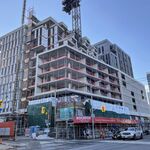And London has no highways leading to its centre at all, and it's the financial capital of Europe. Just like new highways downtown don't necessarily destroy quality of life, they're also completely unnecessary. As for the suburbs, transit ridership and density are increasing. But suburban driving habits have nothing to do with whether we need a third highway downtown. If there's a fast, reliable alternative to driving downtown, even hardcore suburbanites will take it. Especially in rush hour.
By the way, those quality of life surveys rate Melbourne as only marginally higher than Toronto. Hardly any difference at all. Just from a quick look at google, it looks like that downtown tunnel doesn't dump traffic onto other highways the way a 400 extension would with the Gardiner.
That's kind of the point. No matter how many people take up the option (and it seems like demand is higher than supply on pretty much every GO line), the highways will still be congested.




